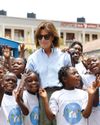Try GOLD - Free
The High Price Of Addicton
Forbes Africa
|August 2017
Drug and alcohol problems seem to be increasing in Africa but treatment is often scarce and steep.

Brian Muhumuza, a recovering alcoholic who has been sober for more than three years, is a refugee in Johannesburg, because there are no rehabilitation centers in his home country of Uganda.
“When I wanted to stop drinking at around 25, the only option I had for help was the church. I thought then that if my only option was religion, I would rather just drink through my problem.”
Fortunately, Muhumuza’s mother worked at a medical facility and was able to provide medication while he attempted to stop drinking.
Muhumuza is fortunate. He is one of the few who managed to get treatment. For most, treating an addiction is either inaccessible or unaffordable.
Around 5% of the world’s adults, or nearly 250 million people between the ages of 15 and 64, used at least one drug in 2014, according to the latest World Drug Report released last year by the United Nations Office on Drugs and Crime (UNODC).
It reported that the number of people classified as suffering from drug use disorders has increased disproportionally for the first time in six years. There are now over 29 million people within this category (compared to the previous figure of 27 million). Additionally, around 12 million people inject drugs, with 14% of these living with HIV, according to the report which was released in June 2016.
The report highlights a strong link between poverty and drug problems. Indeed, the brunt of the drug use problem is borne by people who are poor in relation to the societies in which they live, as can be seen in stark terms in wealthier countries.
“The strong association between social and economic disadvantage and drug use disorders can be seen when analysing different aspects of marginalization and social exclusion, such as unemployment and low levels of education.”
This story is from the August 2017 edition of Forbes Africa.
Subscribe to Magzter GOLD to access thousands of curated premium stories, and 10,000+ magazines and newspapers.
Already a subscriber? Sign In
MORE STORIES FROM Forbes Africa
Forbes Africa
AI: A LADDER TO PROGRESS OR A TRAP OF DIVISION? THE CHOICE IS OURS
Artificial intelligence (AI) is not a neutral force. It is an amplifier. It can magnify our brightest innovations or our darkest biases. It can serve as a ladder for human development or a trap that widens inequality. The path it takes is not pre-programmed by algorithms; it will be determined by the choices we make about trust, capability, and cooperation.
3 mins
October - November 2025

Forbes Africa
Lady Mary Dinah: The Philanthropist Redefining Wealth And Purpose On A Global Scale
Lady Mary Dinah, officially the Lady of Ellington, is a distinguished food and nutrition expert, humanitarian, and philanthropist reshaping global aid and advancing food security, especially within Africa's most vulnerable regions. Through Mary Dinah Foundation and pioneering initiatives such as the Maternal and Newborn Fund, she is bridging the gap between innovation and community impact.
2 mins
October - November 2025

Forbes Africa
Red Socks Golf Day Rallies Support For Ronald McDonald House Charities
The annual Red Socks Golf Day, hosted in partnership with McDonald's South Africa suppliers, took place in Johannesburg on August 28, raising significant funds for the continued operation of Ronald McDonald House Charities (RMHC) South Africa. This longstanding event highlights the power of collaboration and shared purpose, ensuring that families can find comfort and support during their most difficult times. RMHC South Africa is an independent nonprofit organization governed by a Board of Directors and operated by dedicated staff and volunteers. Its mission is to create, find, and support programs that directly improve the health and well-being of children and their families.
2 mins
October - November 2025

Forbes Africa
Unleashing The Potential Of Every Child: Committing To Sustainable And Transformative Philanthropy
Founded in 1963 by Princess Grace of Monaco and now chaired by H.R.H. Princess Caroline of Hanover, AMADE-Association Mondiale des Amis de l'Enfance (World Association of Children's Friends)-defends an ambitious and deeply human vision: a world where every child, regardless of their social, religious, or cultural background, can live with dignity, in safety, and with respect for their fundamental rights, and become an actor in their own life.
2 mins
October - November 2025
Forbes Africa
AFRICA'S TECH GROWTH NEEDS MORE THAN VCS-IT NEEDS CORPORATES
At the AWS Summit in Johannesburg in August, I sat down with Christophe Viarnaud, founder of AfricArena, to unpack the state of African tech. Few know the terrain better: his platform runs summits across four continents and publishes one of the most widely-read reports on venture capital in Africa.
2 mins
October - November 2025

Forbes Africa
REEF RELIEF
AFTER THE WORLD-FIRST BLUE BOND IN 2018, EFFORTS ARE NOW UNDERWAY IN THE ISLAND NATION OF SEYCHELLES TO RESTORE BLEACHED REEFS AND SUSTAIN ITS BLUE ECONOMY.
3 mins
October - November 2025
Forbes Africa
Redefining Startup Growth In Africa
Across Africa, startups often ignite with promise but stumble in execution. One emerging company believes it has developed the infrastructure needed to change the odds.
3 mins
October - November 2025

Forbes Africa
The True Purpose: Building Futures
IT'S TIME TO SHIFT THE LANDSCAPE. WHAT IF WE FOCUSED GLOBAL FOOD AID AND PHILANTHROPY ON PROVIDING THE NUTRITION ESSENTIAL TO A CHILD IN THE FIRST 1,000 DAYS? THE IMPACT COULD BE TRANSFORMATIONAL.
2 mins
October - November 2025

Forbes Africa
RUGBY, ROOTS AND RESPONSIBILITY
MEET THE RISING GLOBAL RUGBY LEAGUE TALENT MAKING CAMEROON PROUD.
2 mins
October - November 2025
Forbes Africa
UBUNTU IN ACTION: BRIDGING TRADITION AND INNOVATION FOR COMMUNITY EMPOWERMENT
Although the word is derived from southern African Nguni languages, the concept of Ubuntu finds roots across Africa. Of course, while there are direct translations, Ubuntu really represents an ethic of interdependence, where the flourishing of the individual and the wellbeing of the community are seen as mutually reinforcing rather than opposed. In advocating for what he refers to as 'Ubuntu Stoicism', Tiisetso Maloma argues: \"Ubuntu signals a sense of personal responsibility. The community benefits from the virtues of responsible individuals. They also serve as inspiration to others, particularly the younger generation.\" From the perspective of an academic and head of an institution, there is a distinct connection to be made with the very pursuit of academia.
2 mins
October - November 2025
Translate
Change font size

